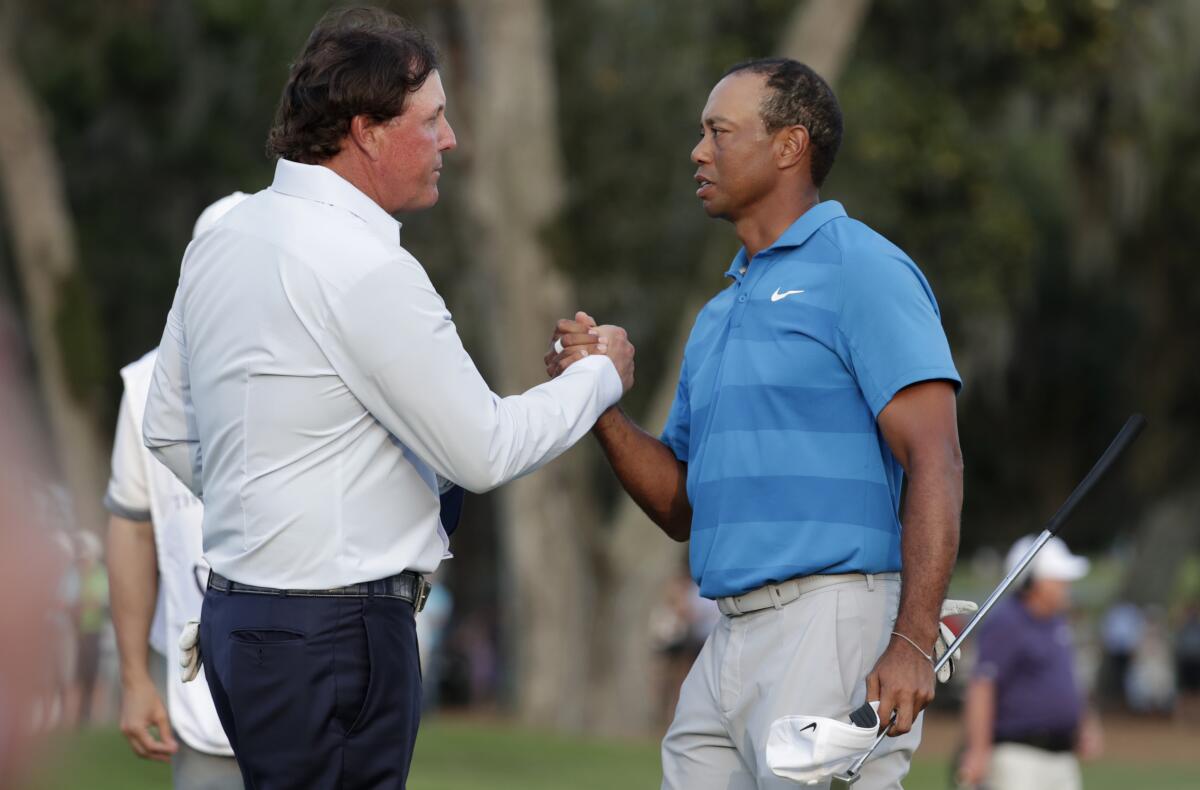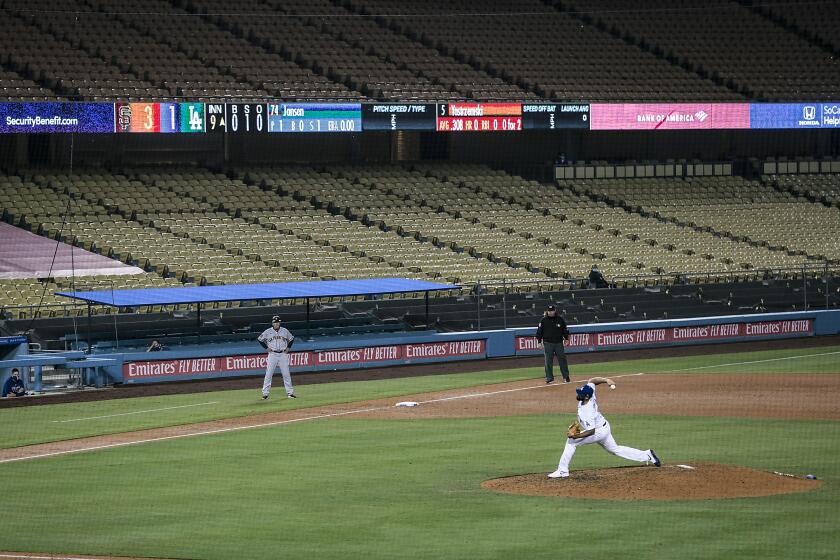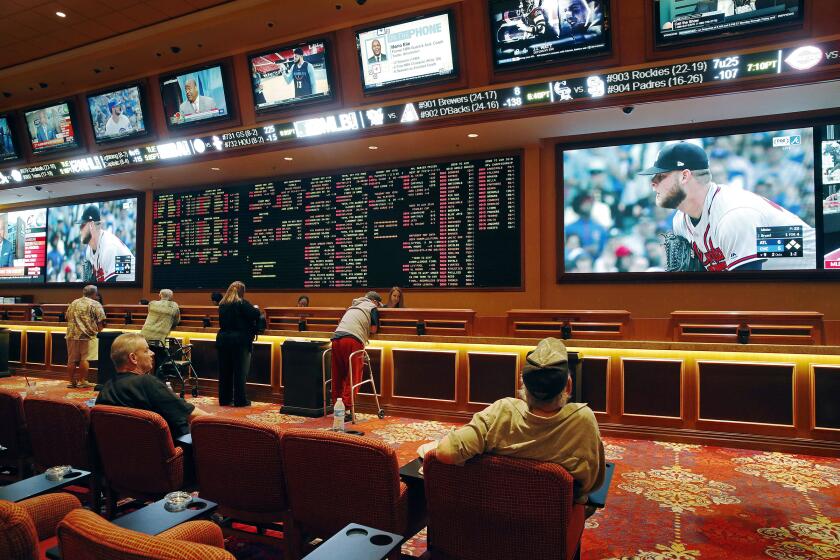PGA Tour aims to be the next frontier for rampant legal gambling despite risks

- Share via
The inherent connection between golf and gambling begins with numbers.
Four buddies get together on a Saturday morning at their local municipal course. By the end of the round, they have played 18 holes and hit hundreds of shots, giving them plenty of chances to wager on more than just the final score.
Now apply that equation to a professional tournament with as many as 156 players, 30,000 or more total shots and detailed statistics on everything from driving distance to bunker saves.
“Golf is a good fit for gambling,” said Victor Matheson, a sports economist at College of the Holy Cross in Massachusetts. “There are an infinite number of things you can bet on.”
With sports betting becoming legal in more and more states, the math has PGA Tour executives looking to use gambling as a lure to draw more fans. And the coronavirus outbreak has given them a chance to jump-start this effort.
As one of the earliest sports to resume play after the COVID-19 lockdown, golf has targeted bettors waiting for the football season and NBA playoffs. It has become the fourth most-popular wagering sport on the DraftKings site and, with the PGA Championship beginning Thursday, has seen a 400% increase in wagers at one Las Vegas sportsbook.
“The tournaments have been great,” said Jay Kornegay, vice president at Westgate Las Vegas. “Golf has taken advantage of the opportunity.”
Experts say playing in arenas and stadiums with no fans can have a wide variety of effects on athletes. Some may perform better, others worse.
But the gambit comes with risk. There are fears of corruption and doubts about whether the tour can convert short-term bettors into longtime followers. As Kornegay said: “It’s a tall order for golf to retain their current market.”
::
Side bets were part of the game for Ben Hogan and Sam Snead. An old photo shows Jack Nicklaus handing cash to Arnold Palmer after a round. During practice for the 2014 Masters, Phil Mickelson bet a mouthy fan he could make par from just off the green.
“I missed it and I had to pay him,” Mickelson told reporters. “That’s what happens when you lose.”
Golf’s history of casual wagering morphed into serious business in 2018, when a Supreme Court ruling opened the door for states to legalize sports betting.
Tour executives, always on the hunt for “fan engagement and audience development,” moved quickly. If gambling and fantasy leagues could get people to watch lukewarm NFL games and mid-major college basketball, maybe it could work for, say, the Rocket Mortgage Classic.
“People who like betting like to bet on anything, it seems,” Top 10 player Adam Scott said around the time of the Supreme Court ruling, adding that golf “might pick up a few more fans from that.”
The tour signed multi-year deals with DraftKings and London-based IMG Arena, which distributes data to a range of betting operators. It partnered with the Action Network to launch a “GolfBet” platform for stories and information on gambling.
The game had something working in its favor — bettors like to research and the tour has tons of data through ShotLink, which records every shot from every tournament, with numbers that can be broken down into arcane categories such as “left rough tendency” and “scrambling from the sand.”

As the 2019-2020 season approached, tour executives updated the system with high-tech equipment and more supervisors to manage the armies of volunteers who mark down shots at tournaments.
“Every year we get a little better,” said Norb Gambuzza, the tour’s senior vice president of media and gaming. “We feel very comfortable about where we are.”
Though Las Vegas has done good business with conventional wagers — Who will make the cut? Who will finish in the Top 10? Who will win? — the future could bring a wider variety.
Which player will hit the longest drives or make the most birdies? Who will have saves from the rough? Even better, the game’s languid pace allows time for wagering on the next shot.
“What golf is good at is live gambling, where it’s happening in real time,” economist Matheson said. “Is Tiger going to make this putt? What’s going to happen with these two guys on the 16th hole, who’s going to do better?”
This season, ESPN+ is live-streaming two featured holes at each tournament. That includes par-3s, which are golf’s version of instant gratification, with fans crowded around the green, betting on who will hit closest to the pin. The tour is moving toward wall-to-wall coverage, where viewers can watch the same hole all day or follow a particular golfer through the round.
“Once you make it live, people can make 100 bets during the course of the day,” Matheson said. “That’s where the money is.”
It’s also where trouble lurks.
::
Baseball had the 1919 Black Sox. College basketball had point shaving in the 1950s and the NBA had referee Tim Donaghy conspiring to fix games. No sport wants a scandal.
Golf faced a minor controversy in 2016 when Mickelson got snared in a federal investigation and agreed to repay nearly $1 million allegedly made from insider trading. Authorities said he got the tip from gambler Billy Walters and used the money to repay gambling debts.
Though he was never charged, Mickelson took “full responsibility for the decisions and associations that led him to becoming part of this investigation,” according to a statement issued by his management group.
Two years later, the tour established rules that, while not addressing informal bets on the course, prohibited players from wagering on tournaments or providing information to gamblers. An outside firm was already monitoring the betting markets internationally.
Legalized sports gambling in California has yet to become a reality, but companies are already preparing for a massive response from the public.
“Once in a while we’ll see an abnormal blip,” Gambuzza said. “But we have yet to encounter any significant issue that had to be dealt with.”
Some players have already felt gambling’s influence: Jason Day talked about facing criticism for withdrawing from tournaments because of a recurring back injury.
“I heard some article about sports betting and some nonsense about reports with regards to injuries,” he told reporters at the 2019 Players Championship. “I’m like, I mean, are we going to get into psych reports … you’re going down kind of a really rocky road when it comes to that stuff.”
The gallery also could become a problem. If a fan has big money riding on, say, Rory McIlroy, might he try to distract other players by shouting during their backswing or putt?
“We know it’s a risk,” Gambuzza said. “And, frankly, there’s really nothing you can do to 100% eliminate that risk.”
The benefits of increased gambling activity are potentially great enough that tour executives are willing to take a chance.
Their experiment continues with the PGA Championship at TPC Harding Park in San Francisco, where the early favorites include McIlroy, Bryson DeChambeau and Jon Rahm. With the NBA, MLB and NHL having resumed play, the tour is watching to see how many bettors stick with golf.
“We very much want to reach those people,” Gambuzza said. “Try and draw them in.”
More to Read
Go beyond the scoreboard
Get the latest on L.A.'s teams in the daily Sports Report newsletter.
You may occasionally receive promotional content from the Los Angeles Times.













